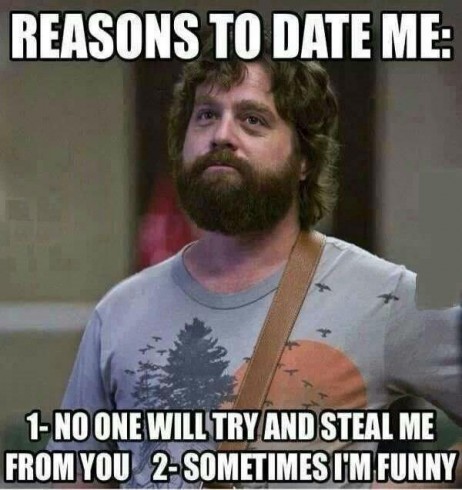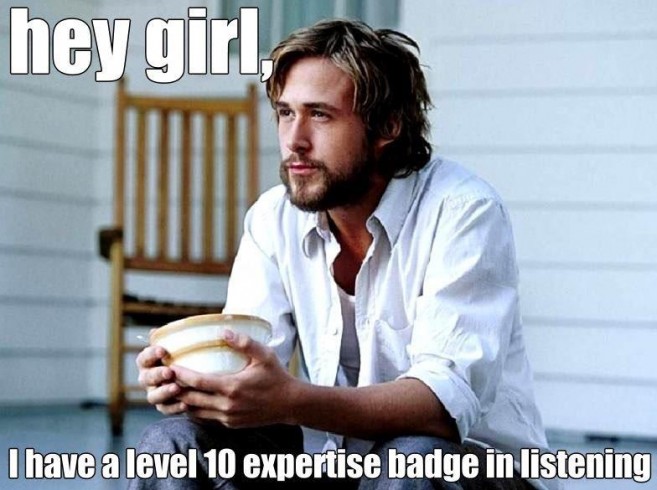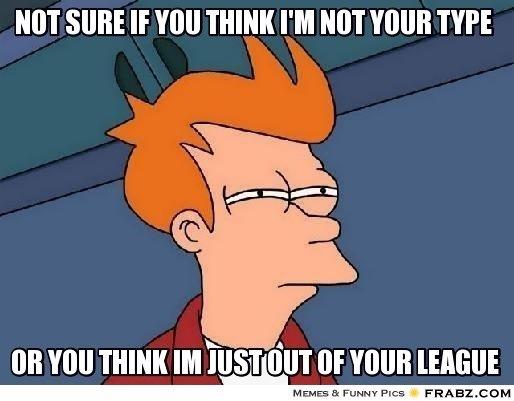
Remember when you split up with your girlfriend because she wouldn’t stop using you as a credit card? Remember when you didn’t want to move in with someone who couldn’t part with their three obnoxious cats, despite knowing you couldn’t stand felines at all? Remember when you mustered up enough courage to ask out the girl or guy you’d been tentatively eyeing for a good six months, and they smiled apologetically and said, ‘I’m sorry, you just aren’t my type’?
If there’s anything we should’ve learned from experiences such as this, it’s this: People have specific ideas about what and who they should invest their time and emotions in – and that’s that. You could be offering the most gorgeous one-bedroom apartment in town, but someone who needs a three-bedroom place doesn’t care. You could look like a more rugged version of Channing Tatum, but someone who’s decidedly into older men wouldn’t be interested. You could pen down the most compelling narrative on the planet, but someone who can’t read isn’t going to see the merit in it. If you want someone to become and stay interested in you, who you are and what you offer has to match with what they’re looking for.

But people hookup without all these complications all the time
Of course, it’s possible to hook up without a genuine interest in each other. But the problem with one-night stands and hookups is just what the terms imply – they aren’t going to last. That might suit you if you just want a fling but when you’re sweating and exerting your brain cells to create quality content, you want a return on your investment that isn’t uncertain.
Like in a courtship that involves your heart and mind, you want a relationship that lasts.
That’s why defining your type is so important, when it comes to online marketing. You’re in a marketplace that has billions of alternatives – and if that figure doesn’t intimidate you, you aren’t visualizing it right. Think of it this way: If you sat down to count from one to one billion, you would be counting for 95 years (and let’s not forget, average life expectancy in the US is just 78 years) – so you’re in a marketplace that offers billions of alternatives to each person. Each individual has to narrow down from those billions to choose the ten, fifteen, maybe twenty (if you’re lucky) alternatives they want to invest their time in, to fulfil their informational, entertainment, belonging, connectivity and other needs.
How do you think they’ll narrow it down?

The same way you and I narrow down people on Tinder – by looking at what the potential partner offers, and whether that meets our needs – whetherit fits in with our ‘type.’Otherwise? Swipe left.
So what’s YOUR type?
I often ask copywriters this question. Some answers I’ve received are:
- Well, I write engaging content that means something.
- I’m a marketer. I try to please whoever is reading.
- I don’t know if I could sum that up very well. I write about a range of topics, so everything from sports to makeup to religion to literature – whatever I can use to advertise.
- Uh, I’m not sure, I never really thought about it.
While the content these copywriters produce might not be bad (it could be incredible, even mind-blowingly successful), these are all terrible answers because they display a lack of purpose and mission. You could succeed with this in the short run and, with a stroke of luck, maybe even for years and years – but it is never going to be the average copywriter’s guaranteed formula to success.
What is?
There are never any clear cut answers in marketing. But remember the ‘your-offer-must-match-what-the-other-is-looking-for’ principle? In almost all cases, this same principle applies in online branding and advertising. Knowing your type is the basis for understanding what you’re marketing, and who would be interested in that. Without knowing that, you can’t create specialized or targeted content.
What’s the big deal with targeted content? If you create vague content and throw it at everyone out there, you might catch the fancies of a few people. But if you create specialized content, the chances of conversion are much higher. Once you understand your audience, you’ll create offerings relevant to their needs, making the chances of engagement –whether it’s in the form of readership, shares or purchase – far greater because you are targeting serious ‘buyers’ only. These are the people who have the time or inclination or moolah to invest in your platform – all you need to do now is to let them know for certain that you’re the type they’re looking for.

But what does defining a type involve?
That’s a good question, and one that’s far more nuanced than it might seem at first. There are so many ways you can define your type, but all of these ways start with understanding that all your content must, absolutely must, have one constant – something underlying all the copy you create, that brings it together. Here are a few ‘definitions’ I’ve seen working well:
- By niche:Promise Tamang started off with YouTube videos of herself using makeup and tutorials to transform into characters and celebrities; she now operates on multiple social media platforms, with 790 thousand followers on Instagram and a number of magazine covers and brand endorsements under her belt. How has her content expanded? Not at all in terms of focus – she is still doing and writing about transformational makeup tutorials (although she’s used her celebrity status to give to humanitarian causes, which is a pretty cool benefit of having defined her type!)
- By industry: We’ve all heard of Mashable. But how many of us know Pete Cashmore, the entrepreneur behind the website which now sees 43 million visits per month? Cashmore started copywriting with blogs that focused on social networks – one of his first articles was ‘If You Don’t Have A Myspace, You’re a Lametard’! – and as his popularity grew, he continued to focus on the power of social media, eventually establishing Mashable as a leading digital media company that caters to a ‘connected generation.’
- By community/ affiliations:People often have affiliations that come with specific triumphs and challenges –Latinos, African-Americans, LGBT activists, women’s lib supporters, international students, the list goes on. WIMN’s Voices features a diverse online community of 50 bloggers, all of whom cover different topics (and when I say different, I mean different – the blog covers everything from journalism and murder to rehab and finance!). What’s made a platform with so much diversity in copy and copywriters so popular? The fact that all the copy is geared to report and analyze the social, cultural and political issues that affect women.
Of course, not everyone is able to restrict themselves to certain streams or topics. Some people grow their businesses by linking themselves to everyone and everything. Others are opportunists who grab on to and leverage the latest trends and developments from all over the place. Some of these are successful; others fail. There’s no reason writers who can’t engage one stream of thought can’t define their type, however. Their salve and savior is a concept that is also important for specialized or focused copywriters, as their brands begin to develop: Brand personality.
Wait, isn’t personality for humans?
Well, not only for humans. Brand personality is a marketing concept that refers to how consumers view a brand – the adjectives most of them use to describe how it comes across as.Rolex, for example, has a ‘sophisticated’ brand personality; consumers define it as elegant, world-class, prestigious. The global giant has created this brand personality through all aspects of its advertising – such as the slogans and taglines it uses (A Crown For Every Achievement, Class Is Forever) and the brand ambassadors it signs on (Roger Federer, Carmen Dell’Orefice, Lorena Ochoa, to name a few).

In the same way, the content you put up on your blog defines its personality. Remember that one charismatic guy or girl who can talk on and on just about anything in the world, but people will always be entertained because he or she is just so funny? Sometimes, it looks like people are able to pick up partners based on just that – how humorous or entertaining or well-dressed they are. The same goes for copy. The topics for any two posts you make might vary drastically, but if you know the brand personality you’ve chosen to develop – humorous, adventurous, controversial – then you can amass a readership that keeps coming back for the characteristics.
A final word on type definition

It goes without saying that there are no absolutes in a field like marketing – let alone online marketing, where most platforms come with little to no restrictions for access. In general, however, brands that don’t define their niche fail time and again because it’s virtually impossible to cater to everyone. Sooner rather than later, you will piss someone off – and a lot more frequently than you would if you define a focus.
But look at the most visited websites and blogs out there: they’re almostall specific. Whether its fitness or cosmetics, religion or video games,travel or literature, the best platforms cater to one brand promise. Ramsay Taplin at BlogTyrant has amassed a substantial fan following on the World Wide Web by focusing solely on helping others grow their social media businesses. Michelle Phan went from a fresh blogger to a global spokesperson for Lancôme in less than five years, by specializing in makeup tutorials. She was showing people how to do makeup when writing a small-scale personal blog in 2005 – and she’s showing people how to do makeup now, when she has a line of her own at L’Oreal. Even the infamous Perez Hilton has developed a cult following by being true to the notorious brand personality his blog has developed.
Defining your type is not just about aligning your copy to a specific segment. Like in courtship, knowing why you’re in the relationship and what the other person is looking for provides clarity on how to proceed next and what to amend in yourself.It predicts reactions, provides controls, helps in creating incredible content, and catalyzes word-of-mouth success. Copywriters have one purpose – to achieve the outcomes they desire from their copy – and defining your type can very well be the one reason your brand turns into an online empire, while other brands crumble and disappear.